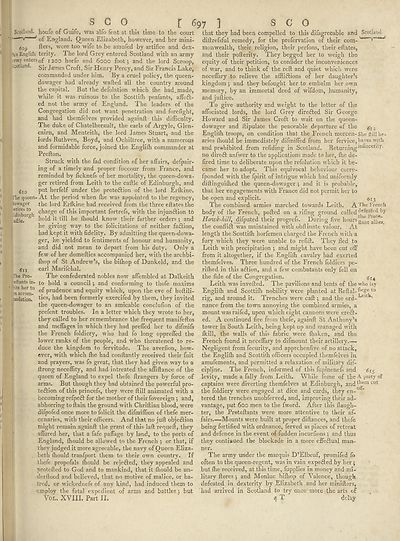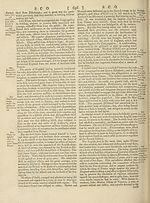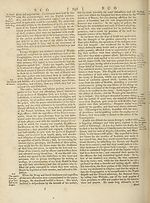Encyclopaedia Britannica, or, a Dictionary of arts, sciences, and miscellaneous literature : enlarged and improved. Illustrated with nearly six hundred engravings > Volume 18, RHI-SCR
(735) Page 697
Download files
Complete book:
Individual page:
Thumbnail gallery: Grid view | List view

SCO
Scotland, houfe of Guife, was alfo fent at this time to the court
v of England. Q^ueen Elizabeth, however, and her mini-
(jop Hers, were too wife to be amufed by artifice and dex-
'tnEnglifh terity. The lord Grey entered Scotland with an army
rmy enters of 1200 horfe and 6000 foot; and the lord Scroop,
1 697 1
SCO
Scotland-
Scotland.
610
The queen'
iowager
etires to
Ldinburgh
altle.
611
The Pro-
eftants in-
'ite her to
n accom-
aodation.
Sir James Croft, Sir Henry Percy, and Sir Francis Lake,
commanded under him. By a cruel policy, the queen-
dowager had already wafted all the country around
the capital. But the defolation which fhe had.made,
while it was ruinous to the Scottiih peafants, affect¬
ed not the army of England. The leaders of the
Congregation did not want penetration and forefight,
and had themfelves provided againft this difficulty.
The duke of Chatelherault, the earls of Argyle, Glen-
cairn, and Menteith, the lord James Stuart, and the
lords Ruthven, Boyd, and Ocliiltree, with a numerous
and formidable force, joined the Englifh commander at
Prefton.
Struck with the fad condition of her affairs, defpair-
ing of a timely and proper fuccour from France, and
reminded by ficknefs of her mortality, the queen-dowa¬
ger retired from Leith to the cattle of Edinburgh, and
put herfelf under the proteftion of the lord Ertkine.
At the period when (lie was appointed to the regency,
the lord Ertkine had received froth the three eftates the
charge of this important fortrefs, with the injunction to
hold it till he thould know their farther orders ; and
he giving way to the folicitations of neither faftion,
had kept it with fidelity. By admitting the queen-dowa¬
ger, he yielded to fentiments of honour and humanity,
and did not mean to depart from his duty. Only a
few of her domeftics accompanied her, with the archbi-
ftiop of St Andrew’s, the biihop of Dunkeld, and the
earl Marifchal.
The confederated nobles now affembled at Dalkeith
hold a council; and conforming to thofe maxims
of prudence and equity which, upon the eve of hoftili-
ties, had been formerly exercifed by them, they invited
the queen-dowager to an amicable conclufion of the
prefent troubles. In a letter which they wrote to her,
they called to her remembrance the frequent manifeftos
and meffages in which they had preffed her to difmifs
the French foldiery, who had fo long oppreffed the
lower ranks of the people, and who threatened to re¬
duce the kingdom to fervitude. The averfion, how¬
ever, with which ffie had conftantly received their fuit
and prayers, Avas fo great, that they had given way to a
ftrong neceffity, and had intreated the affiftance of the
queen of England to expel thefe ftrangers by force of
arms. But though they had obtained the powerful pro-
teflion of this princefs, they Avere ftill animated with a
becoming refpeCl for the mother of their fovereign ; and,
abhorring to ftain the ground Avith Chriftian blood, Avere
difpofed once more to folicit the difmiffion of thefe mer¬
cenaries, Avith their officers. And that no juft objeftion
might remain againft the grant of this laft requeft, they
affured her, that a fafe paffage by land, to the ports of
England, ffiould be allowed to the French ; or that, if
they judged it more agreeable, the navy of Queen Eliza¬
beth ftiould tranfport them to their oAvn country. If
thefe propofals ffiould be rejefted, they appealed and
protefted to God and to mankind, that it ftiould be un-
derftood and believed, that no motive of malice, or ha¬
tred, or Avickednefs of any kind, had induced them to
employ the fatal expedient of arms and battles; but
VOh, XVIII. Part II.
6t 2
that they had been compelled to this difagreeable and
diftrefsful remedy, for the prefervation of their com-
menAvealth, their religion, their perfons, their eftates,
and their pofterity. They begged her to Aveigh the
equity of their petition, to confider the inconveniences
of Avar, and to think of the reft and quiet Avhich were
neceflary to relieve the affli&ions of her daughter’s
kingdom ; and they befought her to embalm her OAvn
memory, by an immortal deed of Avifdom, humanity,
and juftice.
To give authority and Aveight to the letter of the
affociated lords, the lord Grey directed Sir George
HoAvard and Sir James Croft to Avait on the queen-
dowager and ftipulate the peaceable departure of the
Engliffi troops, on condition that the French mercen-She ftill be-
aries ffiould be immediately difmiffed from her fervice,Eaves with
and prohibited from refiding in Scotland. ReturninginEncenT*
no diredt anfwer to the applications made to her, ffie de-
fired time to deliberate upon the refolution which it be¬
came her to adopt. This equivocal behaviour corre-
fponded Avith the fpirit of intrigue Avhich had uniformly
diftinguiffied the queen-dowager ; and it is probable,
that her engagements with France did not permit her to
be open and explicit. 613
The combined armies marched towards Leith. A The French
body of the French, polled on a riling ground called
Hawk-hill, difputed their progrefs. During five hours a^iej.
the conflidt wras maintained with obflinate valour. At
length the Scottiffi horfemen charged the French with a
fury Avhich they Avere unable to refill. They fled to
Leith with precipitation ; and might have been cut off
from it altogether, if the Englilh cavalry had exerted
themfelves. Three hundred of the French foldiers pe-
riffied in this adlion, and a feAV combatants only fell on
the fide of the Congregation.
Leith AVas invefted. The pavilions and tents of the who lay
Engliffi and Scottiffi nobility Avere planted at Reftal-hege
rig, and around it. Trenches Avere call; and the ord-
nance from the town annoying the combined armies, a
mount Avas railed, upon Avhich eight cannons Avere eredl-
ed. A continued fire from thefe, againft St Anthony’s
tower in South Leith, being kept up and managed with
ikill, the Avails of this fabric were lhaken, and the
French found it neceffary to difmount their artillery.—.
Negligent from fecurity, and apprehenfive of no attack,
the Engliffi and Scottiffi officers occupied themfelves in
amufements, and permitted a relaxation of military dif-
cipline. The French, informed of this fupinenefs and 61c,
levity, made a fally from Leith. While fome of the A party of
captains were diverting themfelves at Edinburgh, andt^mCut
the foldiery were engaged at dice and cards, they en-°
tered the trenches unobferved, and, improving their ad¬
vantage, put 6O0 men to the fAVord. After this flaugh-
ter, the Proteftants Avere more attentive to their af¬
fairs.—Mounts were built at proper diftances, and thefe
being fortified with ordnance, ferved as places of retreat
and defence in the event of fudden incurfions ; and thus
they contiaued the blockade in a more effeflual man¬
ner.
The army under the marquis D’Elbeuf, promifed fo
often to the queen-regent, Avas in vain expected by her;
but ffie received, at this time, fupplies in money and mi¬
litary ftores ; and Monluc biftiop of Valence, though
defeated in dexterity by Elizabeth and her minifters,
had arrived in Scotland to try once more the arts of
4 T deliiy
Scotland, houfe of Guife, was alfo fent at this time to the court
v of England. Q^ueen Elizabeth, however, and her mini-
(jop Hers, were too wife to be amufed by artifice and dex-
'tnEnglifh terity. The lord Grey entered Scotland with an army
rmy enters of 1200 horfe and 6000 foot; and the lord Scroop,
1 697 1
SCO
Scotland-
Scotland.
610
The queen'
iowager
etires to
Ldinburgh
altle.
611
The Pro-
eftants in-
'ite her to
n accom-
aodation.
Sir James Croft, Sir Henry Percy, and Sir Francis Lake,
commanded under him. By a cruel policy, the queen-
dowager had already wafted all the country around
the capital. But the defolation which fhe had.made,
while it was ruinous to the Scottiih peafants, affect¬
ed not the army of England. The leaders of the
Congregation did not want penetration and forefight,
and had themfelves provided againft this difficulty.
The duke of Chatelherault, the earls of Argyle, Glen-
cairn, and Menteith, the lord James Stuart, and the
lords Ruthven, Boyd, and Ocliiltree, with a numerous
and formidable force, joined the Englifh commander at
Prefton.
Struck with the fad condition of her affairs, defpair-
ing of a timely and proper fuccour from France, and
reminded by ficknefs of her mortality, the queen-dowa¬
ger retired from Leith to the cattle of Edinburgh, and
put herfelf under the proteftion of the lord Ertkine.
At the period when (lie was appointed to the regency,
the lord Ertkine had received froth the three eftates the
charge of this important fortrefs, with the injunction to
hold it till he thould know their farther orders ; and
he giving way to the folicitations of neither faftion,
had kept it with fidelity. By admitting the queen-dowa¬
ger, he yielded to fentiments of honour and humanity,
and did not mean to depart from his duty. Only a
few of her domeftics accompanied her, with the archbi-
ftiop of St Andrew’s, the biihop of Dunkeld, and the
earl Marifchal.
The confederated nobles now affembled at Dalkeith
hold a council; and conforming to thofe maxims
of prudence and equity which, upon the eve of hoftili-
ties, had been formerly exercifed by them, they invited
the queen-dowager to an amicable conclufion of the
prefent troubles. In a letter which they wrote to her,
they called to her remembrance the frequent manifeftos
and meffages in which they had preffed her to difmifs
the French foldiery, who had fo long oppreffed the
lower ranks of the people, and who threatened to re¬
duce the kingdom to fervitude. The averfion, how¬
ever, with which ffie had conftantly received their fuit
and prayers, Avas fo great, that they had given way to a
ftrong neceffity, and had intreated the affiftance of the
queen of England to expel thefe ftrangers by force of
arms. But though they had obtained the powerful pro-
teflion of this princefs, they Avere ftill animated with a
becoming refpeCl for the mother of their fovereign ; and,
abhorring to ftain the ground Avith Chriftian blood, Avere
difpofed once more to folicit the difmiffion of thefe mer¬
cenaries, Avith their officers. And that no juft objeftion
might remain againft the grant of this laft requeft, they
affured her, that a fafe paffage by land, to the ports of
England, ffiould be allowed to the French ; or that, if
they judged it more agreeable, the navy of Queen Eliza¬
beth ftiould tranfport them to their oAvn country. If
thefe propofals ffiould be rejefted, they appealed and
protefted to God and to mankind, that it ftiould be un-
derftood and believed, that no motive of malice, or ha¬
tred, or Avickednefs of any kind, had induced them to
employ the fatal expedient of arms and battles; but
VOh, XVIII. Part II.
6t 2
that they had been compelled to this difagreeable and
diftrefsful remedy, for the prefervation of their com-
menAvealth, their religion, their perfons, their eftates,
and their pofterity. They begged her to Aveigh the
equity of their petition, to confider the inconveniences
of Avar, and to think of the reft and quiet Avhich were
neceflary to relieve the affli&ions of her daughter’s
kingdom ; and they befought her to embalm her OAvn
memory, by an immortal deed of Avifdom, humanity,
and juftice.
To give authority and Aveight to the letter of the
affociated lords, the lord Grey directed Sir George
HoAvard and Sir James Croft to Avait on the queen-
dowager and ftipulate the peaceable departure of the
Engliffi troops, on condition that the French mercen-She ftill be-
aries ffiould be immediately difmiffed from her fervice,Eaves with
and prohibited from refiding in Scotland. ReturninginEncenT*
no diredt anfwer to the applications made to her, ffie de-
fired time to deliberate upon the refolution which it be¬
came her to adopt. This equivocal behaviour corre-
fponded Avith the fpirit of intrigue Avhich had uniformly
diftinguiffied the queen-dowager ; and it is probable,
that her engagements with France did not permit her to
be open and explicit. 613
The combined armies marched towards Leith. A The French
body of the French, polled on a riling ground called
Hawk-hill, difputed their progrefs. During five hours a^iej.
the conflidt wras maintained with obflinate valour. At
length the Scottiffi horfemen charged the French with a
fury Avhich they Avere unable to refill. They fled to
Leith with precipitation ; and might have been cut off
from it altogether, if the Englilh cavalry had exerted
themfelves. Three hundred of the French foldiers pe-
riffied in this adlion, and a feAV combatants only fell on
the fide of the Congregation.
Leith AVas invefted. The pavilions and tents of the who lay
Engliffi and Scottiffi nobility Avere planted at Reftal-hege
rig, and around it. Trenches Avere call; and the ord-
nance from the town annoying the combined armies, a
mount Avas railed, upon Avhich eight cannons Avere eredl-
ed. A continued fire from thefe, againft St Anthony’s
tower in South Leith, being kept up and managed with
ikill, the Avails of this fabric were lhaken, and the
French found it neceffary to difmount their artillery.—.
Negligent from fecurity, and apprehenfive of no attack,
the Engliffi and Scottiffi officers occupied themfelves in
amufements, and permitted a relaxation of military dif-
cipline. The French, informed of this fupinenefs and 61c,
levity, made a fally from Leith. While fome of the A party of
captains were diverting themfelves at Edinburgh, andt^mCut
the foldiery were engaged at dice and cards, they en-°
tered the trenches unobferved, and, improving their ad¬
vantage, put 6O0 men to the fAVord. After this flaugh-
ter, the Proteftants Avere more attentive to their af¬
fairs.—Mounts were built at proper diftances, and thefe
being fortified with ordnance, ferved as places of retreat
and defence in the event of fudden incurfions ; and thus
they contiaued the blockade in a more effeflual man¬
ner.
The army under the marquis D’Elbeuf, promifed fo
often to the queen-regent, Avas in vain expected by her;
but ffie received, at this time, fupplies in money and mi¬
litary ftores ; and Monluc biftiop of Valence, though
defeated in dexterity by Elizabeth and her minifters,
had arrived in Scotland to try once more the arts of
4 T deliiy
Set display mode to:
![]() Universal Viewer |
Universal Viewer | ![]() Mirador |
Large image | Transcription
Mirador |
Large image | Transcription
Images and transcriptions on this page, including medium image downloads, may be used under the Creative Commons Attribution 4.0 International Licence unless otherwise stated. ![]()
| Permanent URL | https://digital.nls.uk/193028262 |
|---|
| Attribution and copyright: |
|
|---|
| Description | Ten editions of 'Encyclopaedia Britannica', issued from 1768-1903, in 231 volumes. Originally issued in 100 weekly parts (3 volumes) between 1768 and 1771 by publishers: Colin Macfarquhar and Andrew Bell (Edinburgh); editor: William Smellie: engraver: Andrew Bell. Expanded editions in the 19th century featured more volumes and contributions from leading experts in their fields. Managed and published in Edinburgh up to the 9th edition (25 volumes, from 1875-1889); the 10th edition (1902-1903) re-issued the 9th edition, with 11 supplementary volumes. |
|---|---|
| Additional NLS resources: |
|

